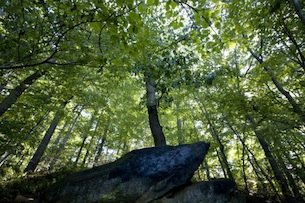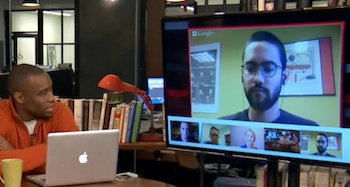Swarthmore Spotlighted for Student Campaign, Efforts on Climate Change

Preserving the Crum Woods of Swarthmore College is one of the many environmental initiatives on campus.
Members of the Swarthmore College administration, faculty, staff, student body, and alumni community are hard at work to achieve environmental sustainability on and off campus. The College realized a 20 percent drop in carbon emissions this past year from its peak in 2005, a direct result of its efforts to achieve carbon neutrality as outlined in the Swarthmore Climate Action Plan. The College had vowed to realize this carbon decrease by 2020. In 2010, President Rebecca Chopp signed the American College & University Presidents' Climate Commitment, joining other colleges and universities in committing the College to address climate change through its operations and curriculum.
The Sustainability Committee of Swarthmore College, made up of faculty, staff, students, and alumni, also collects suggestions and makes recommendations to the President and college community on how to improve environmental sustainability on campus. And, the Crum Woods Stewardship Committee consists of faculty, students, and administrators who meet regularly to discuss the preservation of the Crum Woods, Swarthmore's 200-acre woodland, and its biodiversity.
Student-initiated activities, with support from faculty and staff, are abundant. From the College's oldest environmental student group - Earthlust - to the recent Parrish Beach organic lawn project, students are leading sustainability efforts both locally and nationally. The Green Advisers (GA), an offshoot of Earthlust, are lobbying for green living in dorm halls and community spaces. Swarthmore's Good Food Project is managing community gardens and advocating for sustainable food issues. Swat Frack Action members are raising awareness of hydraulic fracturing - the controversial method of obtaining natural gas from shale. Other Swarthmore students, such as Think Climate members, are initiating discussions about climate change through a weekly radio show and community events. Still others, such as Swarthmore Environmental Justice members, are joining with off-campus organizations to address social and environmental injustice in local communities. And the Ecosphere Coalition, led this year by Patrick Ammerman '14, the Lang Center Environmental Sustainability intern, continues to bring together representatives from all groups once a month to share information on their activities.
As the campus community makes progress toward sustainability and carbon neutrality, several members of the Swarthmore student body are front and center of a grassroots climate-change campaign that has garnered national headlines.
The student group, Swarthmore Mountain Justice, was profiled in The New York Times and interviewed by online news network HuffPost Live and Southern California Public Radio for their campaign calling for the divestment of college and university endowments from fossil fuel companies to raise awareness and counteract the industry's contributions to climate change.
"We've reached this point of intense urgency that we need to act on climate change now, but the situation is bleaker than it's ever been from a political perspective," says William Lawrence '13. Swarthmore Mountain Justice's divestment campaign began in 2010 after a trip to West Virginia where students observed coal mining mountaintop removal.
"The College agrees with its students that the single most important issue in our future is that of ensuring the sustainability of the planet," Chopp says. "We are eager and ready to work with all members of our community on a holistic approach to this challenging issue. We hope to inspire our students to seek policy change at the local, state, and national levels; to educate them to be leaders in the fields that will make a true difference; and to educate ourselves and the full community to be models in our choices in order to reduce our own consumption of fossil fuels."

Over the last year and a half, members of the College administration and numerous faculty members have been in dialogue with members of Swarthmore Mountain Justice. At its December meeting, the Social Responsibility Committee of the College's Board of Managers met and determined that its agenda for the next year will focus on all the ways that the College can work towards overcoming the dangers of climate change. A group of Swarthmore Mountain Justice members also met with members of the Board in December, and presented to them last May. An ad hoc subcommittee of the Social Responsibility Committee has been formed to recommend to the board and to the College how to undertake the discussion about climate change this semester.
Swarthmore Mountain Justice will host a student convergence, "Power Up! Divest Fossil Fuels," on campus Feb. 22-24, 2013. Organized with student groups across the country, this gathering will provide an opportunity for students who are working toward fossil fuel divestment in their campus communities to meet, share skills, and strategize. The College is lending logistical support for the convergence.
History major Ali Roseberry Polier '14 spoke with Southern California Public Radio about the significance of the divestment campaign. "The government doesn't act on its own, and fossil fuel industries don't stop extracting on their own," she says. "It's really when you have people and communities pushing for change by fighting against those structures that something is going to happen."
The Board of Managers has a long-standing policy that engagement through shareholder action, rather than divestment, is the most effective way to put pressure on companies in which it invests. The one exception it made to this policy was during the South Africa anti-apartheid efforts of the 1980s. That decision was controversial, divisive, and costly.
In keeping with its tradition of shareholder engagement, the College recently joined a group sponsored by sustainability network organizer Ceres, the Investor Network for Climate Change. The College is working with students on the Committee for Investor Responsibility to investigate possible shareholder resolutions on which it could co-file. Swarthmore famously effected positive social change in 2002 by exerting influence on a company by virtue of being a stockholder. Three days after Swarthmore informed Lockheed Martin of its intent to re-file a shareholder resolution urging the company to ban discrimination on the basis of sexual orientation in its equal employment opportunity policy, the company announced its plan to add sexual orientation to the policy. Swarthmore students were central in that action.
"There is no disagreement that sustainability is the vital issue for the future and even for the present," Vice President for Community and College Relations Maurice Eldridge '61 explained to Canadian Broadcasting Corporation in an interview. "People like me who have grandchildren, who want their grandchildren to have grandchildren, see this as a very pressing issue, and its moral and practical implications for the future of the planet are huge. So we are with the students on that, and we want to continue the conversation, and look for ways in which we can be effective on this."
To read about more efforts spearheaded by students, faculty, and alums to address climate change, check out the January issue of the Swarthmore College Bulletin focused on sustainability.


